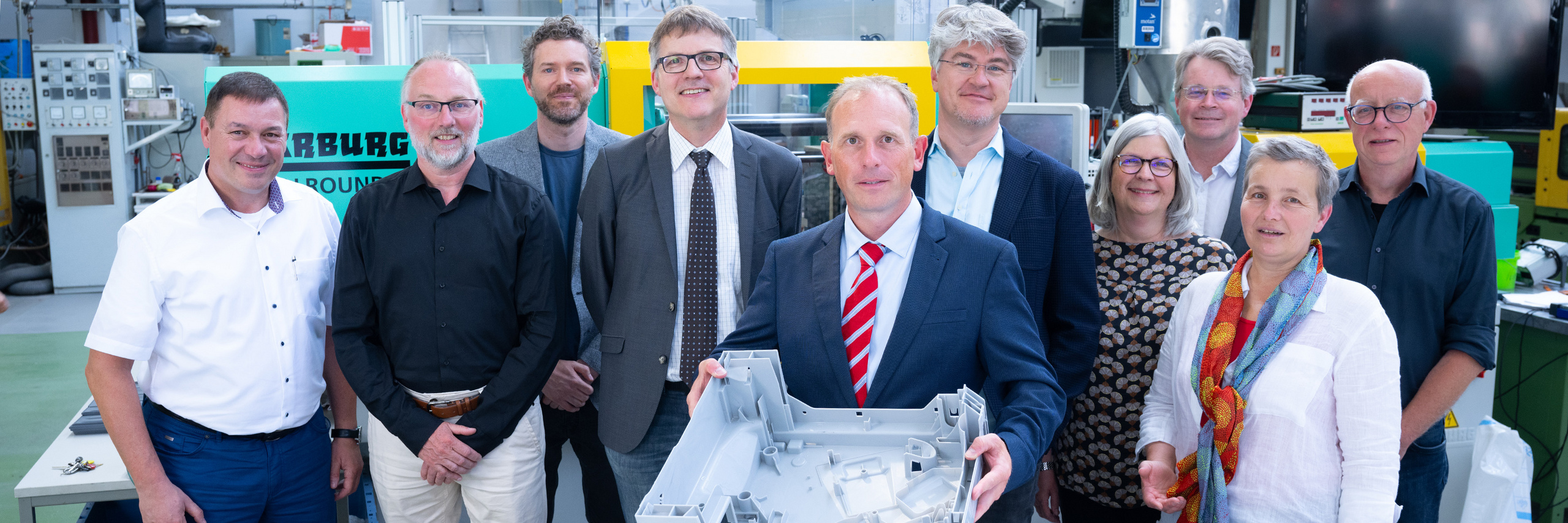Germany’s first “Doctor of Sustainability Sciences”

He will soon be allowed to call himself “Dr. rer. sust.”: Dominik Spancken is the first doctoral candidate to defend his thesis at the still young Doctoral Center Sustainability Sciences of Darmstadt University of Applied Sciences (h_da). The new academic degree of “Doctor of Sustainability Sciences” was created when the doctoral center was established in 2019. h_da is the first and only university in Germany to confer this degree.
By Simon Colin, 10th July 2023
Dominik Spancken’s doctoral project dealt with the sustainable use of recycled plastics, and he now has one year to publish his thesis. Once he has received his doctoral degree certificate, he will be allowed to call himself “Dr. rer. sust.” (Doctor rerum sustinentium) – and be able to claim that he is Germany’s first “Doctor of Sustainability Sciences”. A special moment for h_da as well: the Doctoral Center Sustainability Sciences is the first one that it is operating autonomously. Since 2016, universities of applied sciences in Hesse have had the right to award doctoral degrees in subject areas that are particularly research-intensive and are thus allowed to confer such degrees independently.
“For us as a university of applied sciences strong in research, the first Doctor of Sustainability Sciences is naturally a milestone,” says Professor Nicole Saenger, Vice President for Research and Sustainable Development at h_da. “However, with our Doctoral Center Sustainability Sciences we also want to send a clear signal throughout the whole country: for a shift in society towards more environmental awareness to happen, we need the most capable minds that can support a sustainable transformation from within science.”
Professor Lars Rademacher, Head of the Doctoral Center Sustainability Sciences at h_da: “Our focus on interdisciplinary research enables us to work on new, cross-disciplinary questions typical of the discourse on sustainability. Problems in the context of sustainability can almost always be viewed from several perspectives and are multidimensional, and interdisciplinary research projects can respond to this in a special way.”
In his doctoral thesis, Dominik Spancken explored how conventional plastics can be replaced by recycled ones in white goods components that have to endure particularly heavy stress. Using the example of the base carrier of a dishwasher, he shows that this fundamental part can be replaced by recyclate while still having more or less the same quality. In the production of these more sustainable plastics, up to two-thirds less energy are required to process them. Dominik Spancken has also analysed which obstacles are preventing industry from switching to more sustainable plastics. These currently include slightly higher costs for recycled plastics and the better and more reliable availability of conventional plastics.
“Dominik Spancken shows how it is possible to combine analytical approaches from technical and social science perspectives in a beneficial way in order to foster innovations for sustainable development in society,” says Professor Andreas Büter, an expert in the structural durability of plastics at the Faculty of Mechanical and Plastics Engineering, who supervised Spancken’s doctoral thesis. “For this to succeed, we must take the perspectives of different stakeholder groups in industry, legislation and civil society into consideration.”
Co-supervisor Professor Daniel Hanss, an expert in environmental psychology and sustainability at the Faculty of Social Sciences, adds: “It is precisely here that Dominik Spancken’s thesis – particularly the part with a social science focus – offers important empirical findings from which success factors can be derived for the widespread use of recycled plastics in demanding applications.”
Doctoral Center Sustainability Sciences
At the Doctoral Center Sustainability Sciences, h_da researchers in the fields of construction and environmental engineering, chemistry and biotechnology, electrical engineering, plastics technology and mechanical engineering work together with researchers from the social sciences and social work, economics, the humanities and communication studies on an interdisciplinary basis. Research at the Doctoral Center concentrates on processes and products that make an innovative contribution to sustainable development. In this context, candidates are able to pursue transdisciplinary and interdisciplinary doctoral studies.
Contact
Simon Colin
Press Department
Tel.: +49.6151.533-38036
E-Mail: simon.colin@h-da.de
Translation: Sharon Oranski